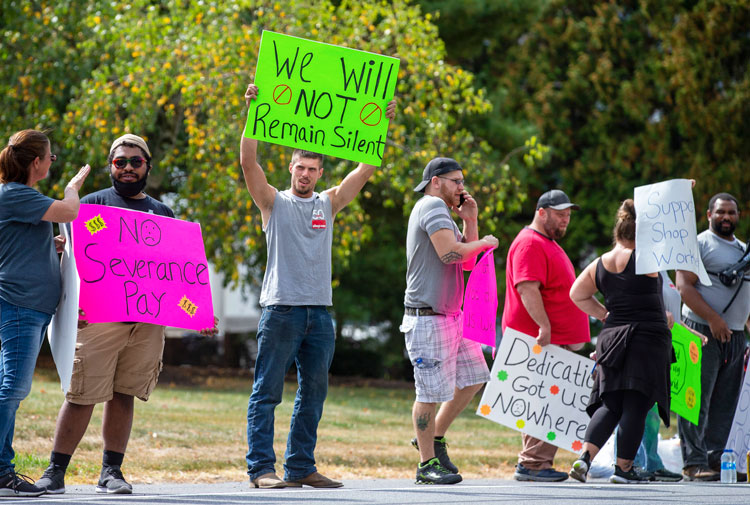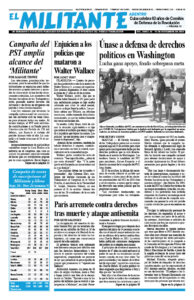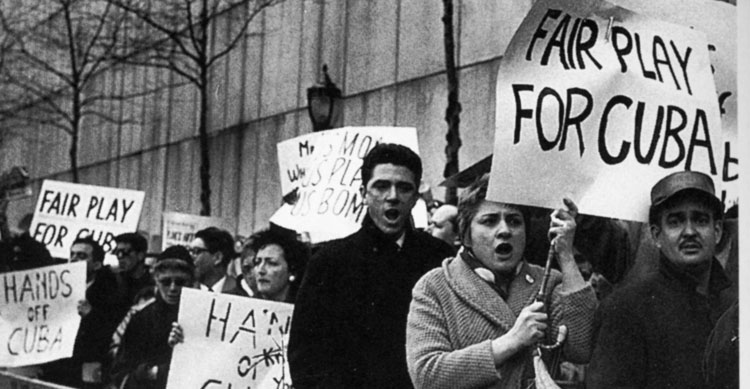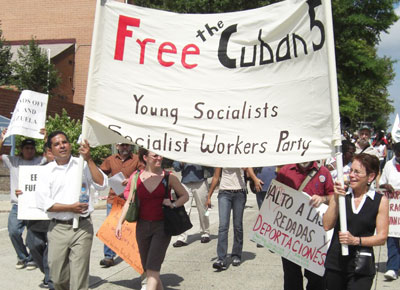An article headlined “Would a Joe Biden White House Be Better for Cuba?” appeared in last week’s print edition of the Militant. It was retracted and not included in the online edition after the National Committee of the Socialist Workers Party pointed out to the editor that the article was contrary to the longstanding editorial positions of the Militant. An editorial concerning the original article appears in this issue (see page 9). [The article Waters is responding to is also included below.]
I welcomed the editor’s invitation to explain, on behalf of the SWP’s elected leadership, why the article represented neither the party’s views nor our decadeslong course of action.
The problems begin with the headline itself. It poses a question the article never addresses. Moreover, it is a question that can’t be answered. What is there to say except, “If Joe Biden becomes the next president of the United States, we’ll see.”
What we do know are two things:
First, whether Biden or Donald Trump is installed in the White House on Jan. 20, 2021, the revolutionary leadership of Cuba will continue on the course they’ve followed from 1959 to today, through 12 U.S. administrations. As they have affirmed many times over the decades, Cuba’s sovereignty and revolutionary principles are not up for discussion, much less negotiation. They are willing at any time to explore ways to resolve problems of mutual concern between Cuba and Washington — or any other government — but only on the basis of equality and mutual respect.
Former Cuban President Fidel Castro explained this course with clarity in his 2016 article “Brother Obama.” That short piece by him had nothing to do with any U.S. election or with one political party versus another, which was how it was quoted and used in last week’s Militant. Fidel was affirming the unbroken record of the Cuban people in defense of their revolution: “Nobody should be under the illusion that the people of this dignified and selfless country will renounce the glory, the rights, or the spiritual wealth they have gained with the development of education, science and culture. … [W]e are capable of producing the food and material riches we need with the efforts and intelligence of our people. We do not need the empire to give us anything.”
Second, for our part, irrespective of who occupies the White House for the next four years, the Socialist Workers Party too will continue on the course we have followed from 1959 to today. We will do everything in our power to make the truth about Cuba’s socialist revolution known to working people in the United States and throughout the world, and organize them to defend what workers and farmers have achieved in Cuba by winning and using state power.

Acting together with others, regardless of views on this or other U.S. elections, the SWP will continue to fight each and every aspect of the U.S. ruling class’s political, diplomatic, and economic war against the Cuban people. We will celebrate as a victory for the Cuban people, and a victory for working people everywhere, any step by any administration, Republican or Democrat, that loosens the imperialist chokehold aimed at overturning the Cuban workers’ political power.
For the SWP, this is not a matter of solidarity alone. It’s also a life-and-death question for the U.S. working class. Without winning a substantial portion of working people in the United States to understand the Cuban Revolution and seek to emulate the example of Cuban workers and farmers, there will be no victorious socialist revolution in the U.S.
That is not some utopian dream. Emulating the example of the Cuban toilers is integral to the working-class consciousness that can and will develop as we together go through growing struggles of our own. This is an irreplaceable part of the political continuity of the Socialist Workers Party and its leadership, of the SWP’s revolutionary working-class course.
2020 elections and Cuba solidarity
The second major problem with the article “Would a Joe Biden White House Be Better for Cuba?” is its opening sentences. “A number of groups here and around the country that consider themselves ‘friends of Cuba’ are promoting Joe Biden’s bid for the presidency as a way to relieve the effects of over 60 years of Washington’s economic and political attacks. These groups are organizing car caravans [in Miami], peddling the myth that Democratic administrations … ‘have been better’ for relations between Washington and Havana.”
The journalistically unacceptable anonymity of the phrase “a number of groups” is plenty reason enough to reject such a lead sentence in a working-class newspaper. But why is it a problem that some friends of Cuba are urging a vote for Joe Biden? Or Donald Trump? Is it a problem that the Socialist Workers Party advocates and organizes everyone we can to support the SWP ticket of Alyson Kennedy and Malcolm Jarrett?
Such differences are hardly limited to the Cuba solidarity movement. They are among the broadest and most important political questions confronting the working class and other oppressed and exploited layers of the U.S. population.
Virtually every individual involved in Cuba solidarity activity supports one or another presidential ticket in 2020. If that fact were a problem that the Militant needs to expose and polemicize about, then there would be no political basis for the National Network on Cuba or any other solidarity coalition in any city or region of the country.
If one or another of those parties or individuals sought to impose support for “their” party or their views as a condition for common action around the one issue that brings us together — opposition to the U.S. imperialist rulers’ policies aimed at crushing the Cuban Revolution — that would be a problem for the Militant to write about. Damaging sectarian factionalism of that kind does regrettably divide Cuba solidarity forces in many countries. But it’s not the issue addressed by the article.
The entire course of the SWP from the earliest months of the revolution has been to build the broadest coalitions possible in defense of Cuba and the Cuban Revolution. That began with our collaboration in early 1960 to build the Fair Play for Cuba Committee, working together with liberal CBS journalist Robert Taber; with members of the U.S. Communist Party; with prominent writers, artists, academics and religious leaders, including James Baldwin, Norman Mailer, Waldo Frank, Carleton Beals and others; with embattled Monroe, North Carolina, NAACP leader Robert Williams; and other Black rights fighters.
In more recent years, the work to build the broadest possible movement in the U.S. and internationally in the successful fight for the freedom of the five Cuban revolutionaries framed up and locked away in U.S. federal prisons embodied the same course.
In joining together to help defeat the U.S. rulers’ attempts to destroy the Cuban Revolution, it makes no difference what party someone supports, what your religious views are, or your position on Israel, Palestine, abortion rights, sex and gender issues, or any other disputed social or political question.
What matters is what you do to help involve new forces and advance the common goal. What you do to oppose attempts to exclude individuals or groups with whom you disagree on other issues. What you do to foster free exchange of political literature, and open, civil debate and discussion.
Trump, Biden and Cuba today
There’s a third way in which the article “Would a Joe Biden White House Be Better for Cuba?” did not express the editorial line of the Militant or the positions of the Socialist Workers Party. That is the way in which it presented the differences between executive actions taken by the Barack Obama administration during its second term versus measures imposed by the Trump administration. The latter have included cutting back travel rights in both directions and depriving Cuba of necessities such as oil, access to the international financial system, and remittances from family members living abroad.
Building on decades of bipartisan measures to economically strangle the toilers of Cuba, the White House over the last two years has added some of the most draconian political and economic measures yet taken against Cuba. These have amplified the impact on the Cuban people of the deepening world capitalist crisis plus the COVID-19 pandemic. Shortages of fuel, medicines, imported food and personal hygiene products are taking a toll on the daily lives of Cuban working people. Last week’s article, which didn’t even mention these consequences of the Trump administration’s course, can seem clueless, even callous.
Instead, the piece concentrated on the case against Biden. Speaking in Miami on Oct. 5, the Democratic Party presidential candidate repeated timeworn lies about the Cuban Revolution. “The [current] administration’s approach is not working,” Biden said. “Cuba is no closer to freedom and democracy today than it was four years ago. In fact there’s more political prisoners, the secret police are as brutal as ever, and Russia is once again a major presence in Cuba.”
Being deliberately vague, Biden has also said he would roll back some of the measures taken by the current administration and return to policies carried out by the Obama administration.
It is wise to remember, of course, that campaign promises are easily and frequently discarded once in office, and Trump holds no corner on aggression against the Cuban people. Examples abound: The 1961 U.S.-organized mercenary invasion at the Bay of Pigs. The 1962 missile crisis, when the U.S. government dangled the threat of nuclear annihilation over not only Cuba but also much of the U.S. and the Soviet Union. The yearslong program of attempts to assassinate Fidel Castro and other central leaders of the revolution. The passage of the Helms-Burton Act in 1996. The 1998 arrest, prosecution and imprisonment of the Cuban Five.
These are only a few of the U.S. rulers’ most notorious acts of aggression against Cuba, and all were carried out under Democratic Party administrations.
That doesn’t mean, however, that the differences within the U.S. ruling class voiced today by Biden and Trump over how best to undermine the Cuban Revolution are irrelevant to the Cuban people.
If a Biden administration were to reverse the direction of some of Washington’s current policies, it would open some breathing room for Cuban working people and their government to more easily deal with the challenges they face. If the boot on their neck pressed less tightly, they would be quite capable of doing that. We would celebrate any motion in that direction, just as we did the steps during Obama’s final years in office to free the last three of the Cuban Five incarcerated in U.S. prisons, reestablish diplomatic relations with Cuba, make it easier for U.S. residents to travel to the island, and other measures.
Vote for the ‘lesser evil’?
For these reasons, it’s probably safe to say that a majority of Cuban working people and their leadership are hoping for a Biden electoral victory. Does that mean it’s in the interests of U.S. working people to give political support to a capitalist party and its candidates?
That question was neither asked nor answered in the article “Would a Joe Biden White House Be Better for Cuba?” But for class-conscious workers in the U.S., that’s the most important question. And the answer is an unequivocal “No.”
For well over a century, the great weakness of the working class in the U.S. — workers of all skin colors, religious beliefs and national origins, both men and women — is the fact that the parties the big majority of working people look to for political leadership are instruments of the capitalist class whose wealth and power stem from exploiting us. Trade unions, churches, organizations claiming to speak for the interests of debt-laden farmers, shopkeepers and contract laborers, African Americans, women, Hispanics, immigrants, Indigenous peoples and more — all, almost without exception, are integrated into the political machinery of the capitalist state and its political parties.
The working class has no political instrument of our own, through which we can debate and make our own decisions, independent of the bosses and their Democratic, Republican, or various “third” capitalist parties. To the degree workers and our unions are drawn into political activity, it’s to try to engage us in capitalist electoral politics. Is he worse or is she worse? Throw the current “bad” guys out and bring the “good” guys in, then repeat the cycle with the same results, year after year, decade after decade … until world capitalism does us all in, in one or another manner.
That profound miseducation will only begin to be bypassed as class battles unfold in factories and other workplaces over wages and working conditions, and struggles for Black rights, women’s equality and other burning social issues become more working class in composition and leadership. The course of those struggles and growth of working-class consciousness will at the same time be accelerated by advances in revolutionary struggles in other regions of the world, in the same way the Cuban Revolution educated and helped transform earlier generations of workers and youth in the United States and elsewhere. Today’s deepening world capitalist crisis brings those days closer.
That’s why the most important aid we can bring to our embattled brothers and sisters in Cuba or anywhere else in the world is to do everything in our power to advance those struggles as we tirelessly educate about the example set by Cuban working people that socialist revolution is not only necessary — it can be made.
Above all, as SWP National Secretary Jack Barnes wrote in Cuba and the Coming American Revolution, we are confident in our knowledge that in the U.S. “the political capacities and revolutionary potential of workers and farmers are today as utterly discounted by the ruling powers as were those of the Cuban toilers. And just as wrongly.”
A needed correction, worthy of study
EDITORIAL
This week’s issue of the Militant features an article by Mary-Alice Waters, “Defending the Cuban Revolution, Strengthening U.S. Working People.” Writing on behalf of the National Committee of the Socialist Workers Party, Waters rejects the content and political line of an article that appeared in the print edition of last week’s paper under the headline, “Would a Joe Biden White House Be Better for Cuba?” [See below.]
Waters is a former editor of the Militant and a longtime member of the SWP National Committee whose leadership responsibilities include politically directing the party’s work in defense of the Cuban Revolution.
The article “Would a Joe Biden White House Be Better for Cuba?” appeared under the byline of Miami Militant correspondent Steve Warshell, but responsibility for its line and content lies with the Militant editor. The editor retracted the article and pulled it from the online edition as soon as the SWP National Committee pointed out that it was contrary to the longstanding positions of the Militant as well as those of the Socialist Workers Party. The print edition, however, had already been mailed to subscribers and distributors in the U.S.
The intent of the editor in the retracted article had been to explain that Washington’s decadeslong course to overturn Cuba’s socialist revolution, and to return the island and its people to exploitation by the U.S. imperialist ruling families, is supported by both capitalist parties. That effort will continue no matter who occupies the White House come Jan. 21, 2021. Our editing of the article not only failed to do that, however, but introduced the errors explained and rebutted by Waters.
The Militant editors wholeheartedly agree with “Defending the Cuban Revolution, Strengthening U.S. Working People.” It’s worth reading more than once. We urge our readers to study and discuss it.
Would a Joe Biden White House be better for Cuba?
BY STEVE WARSHELL
MIAMI — A number of groups here and around the country that consider themselves “friends of Cuba” are promoting Joe Biden’s bid for the presidency as a way to relieve the effects of over 60 years of Washington’s economic and political attacks. These groups are organizing car caravans here, peddling the myth that Democratic administrations — and in particular Barack Obama’s — “have been better” for relations between Washington and Havana, especially better than Donald Trump’s.
But that simply isn’t true, and revolutionary leader Fidel Castro said so. The U.S. rulers’ decadeslong economic war against the Cuban people and their revolution has been uninterruptedly bipartisan. Since the Cuban Revolution in 1959 every administration without exception has sought to be the one to go down in history as the one that brought it down. And Biden aspires to get a shot at doing so again. He already takes credit for attempting it as vice president under Obama.
In October, while campaigning in Little Havana, Biden said “we” need to return to Obama’s policy towards Cuba. The Trump administration’s course “is not working,” he said. “Cuba is no closer to freedom and democracy than it was four years ago.” He promised to continue using sanctions against both Cuba and Venezuela “smartly.”
In 2014, under the Obama administration, the U.S. rulers made a tactical shift, recognizing that decades of brutal sanctions and economic warfare to overthrow the Cuban Revolution had failed. The “new” approach followed by Obama, which Biden says he wants to revive, sought to promote growth of capitalist businesses in Cuba in hopes the workings and “morals” of the market system would undermine the working-class confidence and social relations of solidarity that are prevalent in Cuba as a result of the revolution. Obama and Trump, however, have the identical goal — to reimpose capitalist exploitation and U.S. imperialist control over the island’s land and resources, and over its people.
During President Obama’s visit to Cuba in 2016, part of reestablishing diplomatic relations between Cuba and the United States — something that is still in place — he advised the Cuban people “to forget the past, leave the past behind,” and to open up Cuba to unbridled capitalist investment.
Cuban leader Fidel Castro wrote a response, entitled “Brother Obama.” Despite the U.S. president’s urging, he said, the Cuban people will, and should, never forget the economic and human price they have paid for Washington’s aggressions, including its economic embargo. “We don’t need the empire to give us anything,” he said.
He reviewed the real record of U.S. efforts to strangle the revolution, what Obama wanted Cubans to “forget.”
“After a ruthless blockade that has lasted almost 60 years,” Castro said, “what about those who have died in the mercenary attacks on Cuban ships and ports, an airliner full of passengers blown up in midair, mercenary invasions, multiple acts of violence and coercion?”
“No one should be under the illusion that the people of this noble and selfless country will renounce the glory, the rights,” of what they’ve “gained with the development of education, science and culture,” wrote Castro. “We are capable of producing the food and material wealth that we need with the work and intelligence of our people.”
Biden’s camp has defended, against criticism from the Trump campaign, its plan to return to the positions of the Obama administration as a better way to attack Cuba’s revolution. “In Cuba, engagement is not a gift to a repressive regime. It’s a subversive act,” Juan S. Gonzalez told Americas Quarterly in July. Gonzalez served both as an advisor to Biden and in Obama’s State Department.
The fact is the only campaign for president that offers solidarity with the Cuban people and their revolution is the Socialist Workers Party campaign of Alyson Kennedy. Not only does the SWP call for an end to Washington’s economic assaults against Cuba and for the U.S. rulers to get out of Guantánamo, Kennedy points to Cuba’s socialist revolution as an example for workers and farmers in the U.S. to follow.



